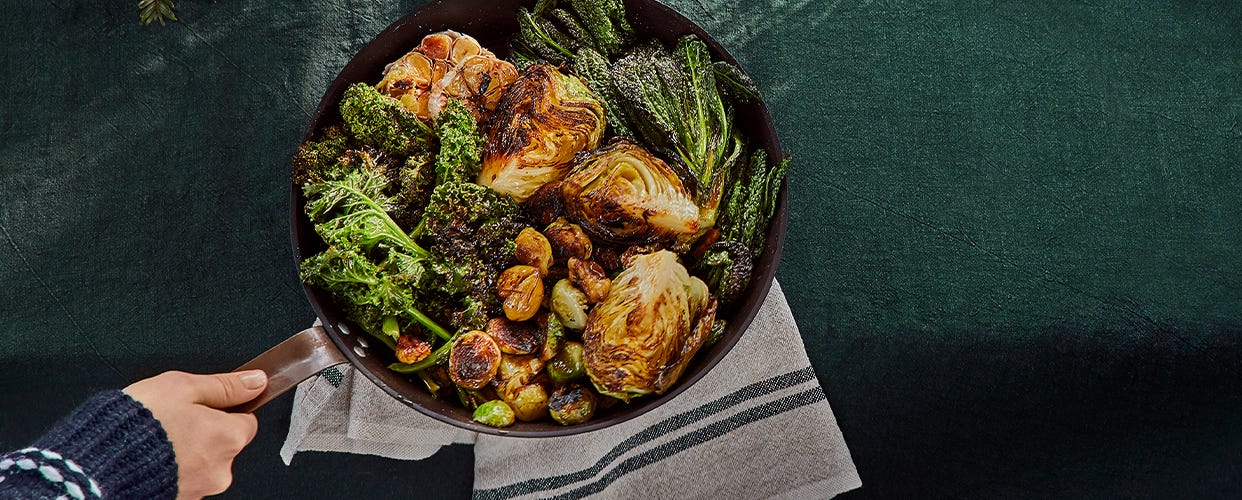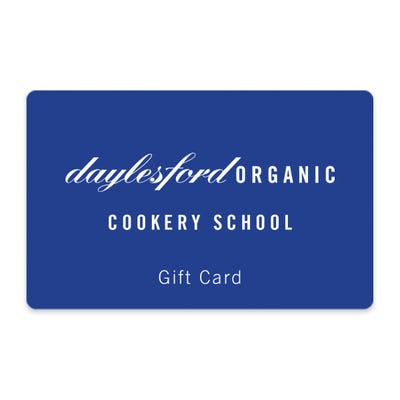
Three Ways With Brussels Sprouts
All You Need To Know About Brussels Sprouts: Cooking,
Health Benefits & Nutrition
We wholeheartedly love brussels sprouts at Daylesford, perhaps because we enjoy dreaming up new and innovative ways to celebrate them.
Brussels sprouts are related to the cabbage and have a subtly sweet, nutty flavour. The small, compact green vegetable is one of the few truly seasonal ingredients, available only during the winter months, at their best after a frost and strongly associated with Christmas.


Sadly, they suffer from a reputation problem, but often people who claim not to like this unfairly maligned vegetable have memories of over-boiled, mushy and sulphurous sprouts.
With a little care and an inventive approach, these seasonal greens can be simply delicious.
Read on to discover how to cook brussels sprouts, the health benefits of sprouts and an overview on the nutrients they offer – along with some of our favourite recipes.


Brussels sprouts: a background
BRUSSELS SPROUTS: A BACKGROUND
Sprouts are thought to originate from Brussels, Belgium in the 13th century, and the name “brussels sprouts” was coined in the 1700s by the French.
They are part of the brassica family of vegetables, along with cabbages, broccoli, cauliflower, kale, wasabi, horseradish and mustard. Brassicaceous vegetables are also known as cruciferous, from the Latin word meaning ‘cross-bearing’, because the four coloured petals of these vegetable flowers resemble a cross.


Sulphur is responsible for the bitter flavours present in a sprouts. Sprouts also contain a chemical which tastes bitter to people who have a variation of a certain gene, which is around half of the world’s population. So it really is 50/50 whether you like sprouts or find them unpalatable. It’s worth noting that as we age, we lose tastebuds, so it is possible that children who dislike brussels sprouts may grow to like them later in life.


How to choose brussels sprouts
HOW TO CHOOSE BRUSSELS SPROUTS
Brussels sprouts are the only brassicaceous vegetable to grow as a bud from a stem. If you can find brussels sprouts still on their thick stalk, they will keep for longer than loose sprouts – and you get the delicious sprout top too. True sprout lovers (including our head gardener Jez) prefer to wait until the outer leaves start to yellow – he says they are truly ripe at this stage. Frosty weather converts bitter starches into sugars, leading to sweeter tasting sprouts – so it is worth waiting for temperatures to drop. Whether on the stalk or loose, store brussels sprouts in a cool, dark pantry or in the fridge.


How to cook brussels sprouts
HOW TO COOK BRUSSELS SPROUTS
If your brussels sprouts are still on the stalk, twist each one off and check for any loose, yellow or damaged leaves. Remove these so you are left with a compact, green ball. You can cut any very large sprouts in half so they are the same size as smaller sprouts, to ensure even cooking. Some people like to cut a cross in the base of a sprout, but this is not necessary and can lead to over-cooking.
Brussels sprouts can be boiled, steamed, roasted, pan fried or eaten raw. To boil, bring a small saucepan of salted water to a rolling boil. Drop in the brussels sprouts, turn the heat down to a simmer and allow to cook for 3-5 minutes or until you can insert a sharp knife into a sprout with ease. To steam, use a steamer basket over simmering water, or bring 1cm of salted water to a boil in a pan, add the brussels sprouts, cover with a lid, reduce the heat and cook until the sprouts are tender and the water has evaporated.
Sprout tops can be prepared like young cabbage or spring greens; sauté in a little butter or steam until tender.
Three of our favourite brussels sprouts recipes include Creamed Brussels Sprouts, Winter Sprout Slaw and Brussels Sprout, Chard & Watercress Socca Tart.


HOW LONG SHOULD YOU COOK BRUSSELS SPROUTS?
Be wary of over-cooking, which can increase the bitter flavours. Check for done-ness with a sharp knife – as soon as you can insert it with ease, the sprouts are done. This should take just 3-5 minutes of boiling or steaming.
BEST WAYS TO MAKE BRUSSELS SPROUTS TASTE GOOD
For a surefire way to make brussels sprouts taste good, whole cooked sweet chestnuts are a and/or crisp cubes of pancetta or bacon are a delicious addition. Sizzle the pancetta or bacon pieces in a hot pan to render the fat, before tipping in cooked sprouts and tossing together.


Are Brussels sprouts good for you?
ARE BRUSSELS SPROUTS GOOD FOR YOU?
One portion of brussels sprouts (80g; about eight individual sprouts) counts towards your recommended daily intake of fruits and vegetables. Brussels sprouts offer plenty of nutritional benefits for most people. They are rich in vitamins and minerals, and even contain anti-cancer and anti-inflammatory properties.
BENEFITS OF EATING RAW BRUSSELS SPROUTS
Enjoy the crunchy texture of raw brussels sprouts by simply shredding on a mandolin, or finely slicing with a sharp knife. Delicious in our winter sprout slaw , Asian-inspired slaw with peanut butter, soy and lime dressing.
WHAT NUTRIENTS ARE IN BRUSSELS SPROUTS?
Brussels sprouts are high in antioxidants and vitamins K and C. They are high in fibre, which supports the digestive process and fuels healthy gut bacteria.
Where can you get organic Brussels sprouts in the UK?
WHERE CAN YOU GET ORGANIC BRUSSELS SPROUTS IN THE UK?
In the winter months, most grocers will have an abundant supply of brussels sprouts. Choosing organic brussels sprouts means you limit your exposure to pesticides and support regenerative farming practices that care for the soil. Read more about how choosing organic food is the best way to limit your exposure to pesticides, herbicides (weedkillers) and many additives and preservatives here.
You can get organic brussels sprouts picked fresh from our organic Market Garden on our Cotswolds farm from our website.



